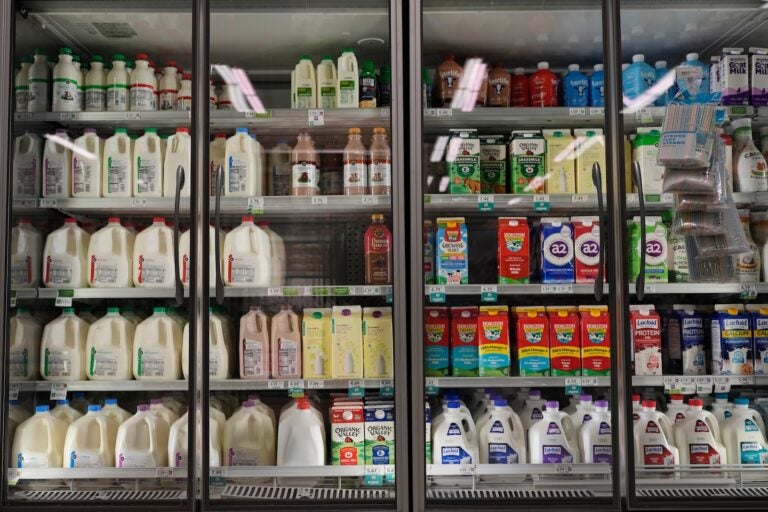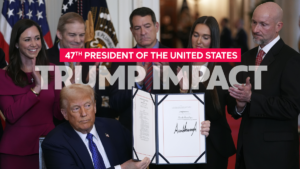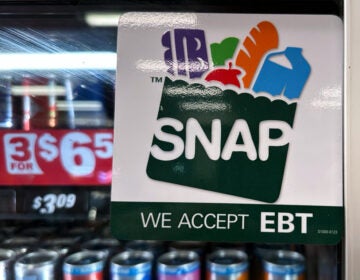Supreme Court extends its order blocking full SNAP payments, with shutdown potentially near an end
Justice Ketanji Brown Jackson was the only one of the nine justices to say she would have revived the lower court orders immediately.

Dairy products, which are covered by the USDA Supplemental Nutrition Assistance Program (SNAP), is displayed for sale at a grocery store Friday, Oct. 31, 2025. (AP Photo/George Walker IV)
SNAP funding delay: What to know
- 42 million people — about 1 in 8 Americans — rely on SNAP
- Locally, that includes nearly 2 million people in Pa., with roughly 685,000 in the Philadelphia region, and more than 800,000 in New Jersey
- Here’s how to find other free food resources in the Philly region and in South Jersey, and how to help
The Supreme Court on Tuesday extended an order blocking full SNAP payments, amid signals that the government shutdown could soon end and food aid payments resume.
The order keeps in place at least for a few more days a chaotic situation. People who depend on the Supplemental Nutrition Assistance Program to feed their families in some states have received their full monthly allocations, while others have received nothing.
The order, which is three sentences long and comes with no explanation on the court’s thinking, will expire just before midnight Thursday.
The Senate has approved a bill to end the shutdown and the House of Representatives could vote on it as early as Wednesday. Reopening the government would restart the program that helps 42 million Americans buy groceries, but it’s not clear how quickly full payments would resume.
Ruling follows path of least legal resistance
The justices chose what is effectively the path of least resistance, anticipating the federal government shutdown will end soon while avoiding any substantive legal ruling about whether lower court orders to keep full payments flowing during the shutdown are correct.
Justice Ketanji Brown Jackson was the only one of the nine justices to say she would have revived the lower court orders immediately, but didn’t otherwise explain her vote. Jackson signed the initial order temporarily freezing the payments.
The court’s action doesn’t do anything to settle uncertainty across the country.
Beneficiaries in some states have received their full monthly allocations while in others they have received nothing. Some states have issued partial payments.
How quickly SNAP benefits could reach recipients if the government reopens would vary by state. But states and advocates say that it’s easier to make full payments quickly than partial ones.
Carolyn Vega, a policy analyst at the advocacy group Share Our Strength, also said there could be some technical challenges for states that have issued partial benefits to send out the remaining amount.
An urgent need for beneficiaries
In Pennsylvania, full November benefits went out to some people on Friday. But Jim Malliard, 41, of Franklin, said he had not received anything by Monday.
Malliard is a full-time caretaker for his wife, who is blind and has had several strokes this year, and his teenage daughter, who suffered severe medical complications from surgery last year.
That stress has only been compounded by the pause in the $350 monthly SNAP payment he previously received for himself, his wife and daughter. He said he is down to $10 in his account and is relying on what’s left in the pantry — mostly rice and ramen.
“It’s kind of been a lot of late nights, making sure I had everything down to the penny to make sure I was right,” Malliard said. “To say anxiety has been my issue for the past two weeks is putting it mildly.”
The political wrangling in Washington has shocked many Americans, and some have been moved to help.
“I figure that I’ve spent money on dumber stuff than trying to feed other people during a manufactured famine,” said Ashley Oxenford, a teacher who set out a “little food pantry” in her front yard this week for vulnerable neighbors in Carthage, New York.
SNAP has been the center of an intense fight in court
The Trump administration chose to cut off SNAP funding after October due to the shutdown. That decision sparked lawsuits and a string of swift and contradictory judicial rulings that deal with government power — and impact food access for about 1 in 8 Americans.
The administration went along with two rulings on Oct. 31 by judges who said the government must provide at least partial funding for SNAP. It eventually said recipients would get up to 65% of their regular benefits. But it balked last week when one of the judges said it must fund the program fully for November, even if that means digging into funds the government said need to be maintained in case of emergencies elsewhere.
The U.S. Supreme Court agreed to pause that order in a ruling late Sunday.
An appeals court said Monday that full funding should resume, and that requirement was set to kick in Tuesday night before the top court extended the order blocking full SNAP payments.
Congressional talks about reopening government
The U.S. Senate on Monday passed legislation to reopen the federal government with a plan that would include replenishing SNAP funds. Speaker Mike Johnson told members of the House to return to Washington to consider the deal a small group of Senate Democrats made with Republicans.
President Donald Trump has not said whether he would sign it if it reaches his desk, but told reporters at the White House on Sunday that it “looks like we’re getting close to the shutdown ending.”
Still, the Trump administration said in a Supreme Court filing Monday that it shouldn’t be up to the courts.
“The answer to this crisis is not for federal courts to reallocate resources without lawful authority,” Solicitor General D. John Sauer said in the papers. “The only way to end this crisis — which the Executive is adamant to end — is for Congress to reopen the government.”
After Tuesday’s ruling, Attorney General Pam Bondi posted on social media: “Thank you to the Court for allowing Congress to continue its swift progress.”
The coalition of cities and nonprofit groups who challenged the SNAP pause said in a court filing Tuesday that the Department of Agriculture, which administers SNAP, is to blame for the confusion.
“The chaos was sown by USDA’s delays and intransigence,” they said, “not by the district court’s efforts to mitigate that chaos and the harm it has inflicted on families who need food.”
___
Associated Press reporter Cara Anna in Carthage, New York, contributed.
WHYY is your source for fact-based, in-depth journalism and information. As a nonprofit organization, we rely on financial support from readers like you. Please give today.





